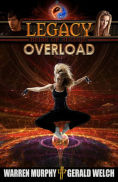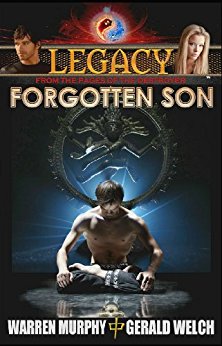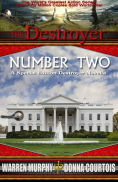AND FINALLY — YES, YOU OUTLASTED ME — I’M DONE… AND HERE ARE A COUPLE OF END PAPERS.
WRITER’S BLOCK –Years ago, a young writer told a friend of mine that he had writer’s block and my friend responded, “You’re not good enough yet to have writer’s block.” A joke to be sure but the fact is that writer’s block is a myth — a non-ailment, invented by non-writers to excuse non-performance.
Did you ever hear of a guy with plumber’s block? Electrician’s block? Did a mechanic ever have mechanic’s block? No, no, and no. The reason is that none of them get paid if they don’t show up to work, so block isn’t really a viable option like flu. However for writers, it often is. Suppose you plan to write four pages in your novel. But you decide to gas up the car and go for groceries and you don’t really feel great anyway, so you skip today’s work, because you’re allowed to do eight pages tomorrow and make up for today’s laziness. But you don’t write those eight pages; sloth has a way of insinuating itself into our lives. Still all right, you can do twelve pages the next day and be caught up. But then you decide that 12 pages is too much for anybody to write in one day, so off you go to the saloon where you tell everybody that you’re suffering from writer’s block. Hey. Wash your face and go to work, and writer’s block won’t happen, you lazy slug. Read Trollope’s autobiography. He worked according to schedule and if he finished a novel, but still had fifteen minutes left in his usual writing day, he would take a fresh piece of paper, write “Chapter One” and get started immediately. Time’s a-wasting, children.
WORKING WITH PARTNERS — I’ve spent much of my life working with writing partners and I wouldn’t trade the experience for more bladder surgery. The truth is that I have been on both sides of the great divide: work with a partner or eschew working with a partner, and how did it turn out? Well, good or bad, everything depends on your timing.
The right partner can enrich your work by bringing to the table more knowledge, more interesting ideas, more illuminating characters than you might be able to do on your own. But they can also be cranky and opinionated and…well, pains in the ass. (I know I am.) So if you’re going to partner with someone, make sure that that someone is the right someone. And then, the most important thing of all — Get everything about your partnership in writing. How is the plotting handled? Who’s in charge of the first draft? Who gets final edit? Who pays for printing cartridges; who buys the paper; whose agent do you use; whose travel agent; who manages the money; who’s responsible for taxes. Get as much as you can in writing and then hope for the best, because no matter how hard you try you can’t get everything in writing. But you stand a chance. Lawsuits are always filed because of the things that weren’t written out: “well, I thought you knew that.” Sorry, nobody “knows” anything….get it in writing. And then hope your partner outlives you; it beats the hell out of the alternative.
WHEN IT PAYS TO BE MEDIOCRE — Back in the long ago, talking sports with the gang somewhere and one of them said of the New York Football Giants that Lawrence Taylor had played “a terrible game.” My response was that it was a terrible game by Taylor’s lofty standards, but he was still the best linebacker on the field for either team. The same thing occurred once watching Julius Erving play basketball and he was struggling some in his own mind, but his opponents still couldn’t beat him.
The point here is this: both players on those days, both Taylor and Doctor J, had mediocre games — everybody’s allowed to, you know. But their level of mediocrity was so high that even when mediocre, in comparison to ordinary mortals, they were very good.
That’s the goal to strive for as a professional writer: keep working to raise your level of mediocrity until the happy day arrives when, no matter how mediocre is your writing, that the product will still be publishable.
You don’t get there by wishing; you get there by working and working some more and then working again. I am proud that I will never be worse than mediocre. (Oh, shut up, liberal thing. Who asked you?)
HELLO, HOLLYWOOD, I MUST BE LEAVING– Hollywood is fertile ground for breeding horror stories and all of them are true. Screen writing is a terrible business, a degrading, humiliating way to make a living. No one should have to do it. It’s committee work and it’s infuriating and someone once said that wanting to be a screenwriter is like wanting to grow up and become a co-pilot. But if you really want to….
One of my favorite mystery writers, Sue Grafton who created the Kinsey Milhone books, would not sell her books to Hollywood for a long time. That’s because she worked there as a screenwriter before she became a novelist and she once explained that you could sit in as a writer on a film story meeting and there would always be someone named Tim or Steve with a mustache sitting over in the corner and every so often Tim or Steve would make some ludicrous suggestion, totally out of touch with reality or even the subject of the meeting. One time, Tim turned out to be a college intern. In another meeting, Steve turned out to be the janitor. Ms. Grafton opted out.
That’s Hollywood, dear friends. The place where, at a story meeting one day, some suit told me that I had no right to be critical of the work under discussion because he liked it and, after all, he was “a cinemackic expert.”
Time for a joke. Neil Simon once said that when it’s 100 degrees in New York, it’s 72 in Los Angeles. When it’s 30 degrees in New York, in Los Angeles it’s still 72. And there are six million interesting people in New York, and in Los Angeles there are 72.
Did you know that in the 1929 Hollywood version of “The Taming of the Shrew,” the credits read: “Written by William Shakespeare. Additional dialogue by Sam Taylor.”
Well, moving right along….
All these lessons that I’m imposing upon you are about writing a novel. If thou wouldst write screenplays, pick up any of the books by Peggy Seger or Syd Field who are brilliant expositors of how it’s done.
In the end though, the basic rule will always be the same: a screenplay is words and you are a wordsmith. So just get a story that works and then do it. Don’t forget. Situation, complication, crisis, climax. Three acts. No longer than 120 pages. Whammo, you’re done. Instant success looms. But never forget William Goldman’s great mantra about Hollywood: “nobody knows anything.”
ANOTHER HORROR STORY ABOUT FILM– It is generally agreed — as much as we opinion-mongers can agree — that among American films, Casablanca with Bogart and Ingrid Bergman was the best of all time. (Okay, okay, so you like Citizen Kane. I like Gunga Din. Too bad for both of us; the majority says Casablanca. To hell with “Vertigo.” It’s moronic.)
Now here’s why Hollywood sucks. In 1982, an unemployed writer submitted a screenplay to a bunch of Hollywood agents as an example of his work. The screenplay was titled “Everybody Comes to Rick’s.” Most of the agents who got it didn’t bother to acknowledge the submission. The 31 agents who did read it rejected it outright with comments to the writer such as “try something that really grabs you.” It later reached the hands of a leading producer who suggested that the story was not right for film but to try making it into a novel.
The screenplay was “Casablanca” — disguised only by changing the names of characters. The greatest American movie of all time was either rejected or not recognized.
That’s a true story (from the New York Times) and it does make you understand what screenwriter and novelist William Goldman meant when he said about Hollywood “Nobody knows anything.”
Some pest, writing a guttersnipe expose, once called me and said that he had heard I had a fistfight with Clint Eastwood during my writing of “The Eiger Sanction.” I replied that I wasn’t that stupid. Also, that of all the people I ever met in Hollywood, Clint Eastwood was one of only two that I didn’t want to punch in the mouth. Clint spoiled me for Lala Land because when I worked for him, he was smart and funny and made decisions quick and straight and I thought everybody out there was like that. It took a long while of suffering with other film jobs before I learned there was only one Clint. Goodbye Hollywood.
BUT DON’T GO FEELING UPPITY– Publishers aren’t much better than the movies. In 1969, Jerzy Kosinski won the National Book Award with a novel titled “Steps.” Just six years later, a freelance writer, graumed because he thought unknowns didn’t have a chance, typed out the first twenty-one pages of “Steps” and sent them out to four publishers, who all rejected the sample. Two years later, he typed out the entire book and sent it to thirteen literary agents and ten publishers, including the one who had originally published the book. It was not recognized or accepted by any of the agents or publishers and the original publisher turned it down with a form rejection letter.
GREAT ADVICE– “Study the writer’s magazines and then pound the hell out of the typewriter.” — Erle Stanley Gardner.
Don’t show anybody partials. Doing that commits you to the story as you’ve so far written it, and makes it much harder for you to rethink or revise it later on. — W.M.
QUITE A CHARACTER– Speaking of the great commercial writer Jack Woodford, he once pointed out that characterization isn’t really manufactured by the writer. Characterization comes from having your character speak and act. Those two things together create characterization. Within bounds, that sounds nigh right to me.
REJECTION? MOI? NAAAAH!
I stole this someplace over the years but I have sent it a couple of times to editors who turned down my work. (I didn’t steal the last sentence. That is my own creation.)
Dear Editor,
Thank you for giving me the opportunity to read your rejection slip. I have read it with interest, but unfortunately, your rejection slip does not meet my present editorial needs. I regret that due to the number of rejection slips I receive, I am not able to respond personally to your rejection slip or to give criticism. I apologize for this form letter. However, I do appreciate your having taken the time to mail me your rejection slip. It has been read by one or more members of my staff. I do wish you the best of luck in placing your rejection slip elsewhere. If you do not know where to place it, I will be ever so glad to let you know.
Cordially,
warren murphy
MORE GOOD ADVICE:
It helps to read a sentence aloud. If you can’t speak it, don’t write it because nobody will believe it. – W.M.
“The publisher is the enemy. An enemy that one may work with fairly amicably on occasion, but an enemy nonetheless…A writer who faces that reality will never be surprised or disappointed by his publisher or by anything that publisher does.” – Bertrice Small
“There is no substitute for living. Writing is not a full-time occupation.” – Ernest Hemingway
AND A FEW FINAL WORDS FROM THE CHEAP SEATS: Perfect is the enemy of good. If you try to write a perfect book, you won’t succeed and you will annoy everybody around you. Aim instead for a good book. If you do that, you may get lucky and sometimes reach very good or even great. But you’ll never reach perfect. Nobody writes a perfect book. Remember what a novel is: a long story that has something wrong with it.
It’s okay to break rules but only if you know the rules. Learn them. And later, break them only when they absolutely need breaking and you’re absolutely sure you know what you’re doing.
You see them all the time at writer’s conventions: would-be writers hugging their manuscript to their bosoms and mouthing “It’s my baby.” Well, lady, it’s not your baby. It’s your manuscript that you hope may someday be a book. Still think it’s your baby? Pick up your manuscript and throw it on the floor. Stomp on it. See? It’s not your baby. It’s a pile of paper. Learn the difference before somebody calls the cops.
Good luck as you move along in the writer’s life. Remember, you are on the side of the angels. It’s us against the savages. Faulkner once said that mankind will not only endure, he will prevail.
But only if you…I…we…don’t quit. Write on. Vaya con Dios, mis amigos.
– warren murphy










As always, a great lesson. But why the last? Please consider writing more blogs like these, even if the originals are made into a book (as they should be). One caveat about your hard-nosed approach to writer’s block, though: Writer’s block may just be a euphemism for fear (as I believe it is), but that fear is nevertheless real. I struggled with fear for many years–well, I still do, but it’s no longer about writing–and found a solution. It is this, handwritten on a piece of paper I keep on my wall directly above my computer screen: “WRITE FAST, WRITE BADLY, WRITE FEARLESSLY. DON’T THINK!” Thinking is what gets us into trouble. Whether we have detailed outlines or are just shooting from the hip, the first draft of a novel must not be thought of as a real book. It’s like mistaking tomatoes for spaghetti sauce. Just a thought. P.S. Even though we never had anything in writing, I’d say our collaborations turned out pretty well.
here i go, molly, just because i’ve never learned to keep my mouth shut…..but i checked with anna swierzbinski and she said it would be all right, so i would simply point out that back in the old days, in talking to young writers, i would suggest to them “don’t worry; just go ahead and Polack your way through it.” and of course that’s what you just said up above in your far-more-gentle-and-acceptable way than mine. but aside from the ethnic outrage; the point is get working, keep working, don’t stop and above all, don’t think too much. the thinking should come before the writing…..or something like that…what the hell do i know?
Thanks for another great piece that gave me several much-needed laughs. I totally agree, there isn’t writer’s “Block”. If you’ve done your work and plotted out what to write ahead of time, it should be no different than fixing a sink or changing a tire. Just follow your own instructions and get ‘er done.
Yes, please more awesome stories like the Clint one. Surely at some point you traded clever barbs with Stan Lee for example. Tell us more, please!
Pingback: Destroyerclub Chat | Destroyerclub
Thank you for a useful and interesting writer’s blog, it really helps.